It took eight quarters, but Apple has recovered its spot at the top of the worldwide smartphone market from Android device maker Samsung, according to the latest numbers from research firm Gartner.
Apple last month announced all-time record quarterly revenues of $78.4 billion on the back of 78.3 million iPhone sales for the three-month period ending in December. Handset sales were particularly strong and broke a record of 74.8 million units set in the year ago quarter.
Gartner puts iPhone end user sales at 77 million units a performance good enough to place Apple at the top of all vendors for the important fourth quarter. Overall, iPhone captured 17.9 percent of the global market, up 2.2 percent from the same time last year.
Samsung followed close behind with 76.8 million units sold and 17.8 percent of the market, down from a 20.7 percent share a year ago. Driving the second consecutive dip in quarterly sales was Samsung's Galaxy Note 7 battery fire fiasco, which resulted in a product recall and, ultimately, complete stoppage of sales.
"The withdrawal of the Galaxy Note 7 left a gap in its large-screen phone range," said Anshul Gupta, research director at Gartner.
Apple was not alone in capitalizing on Samsung's mistake, as Chinese smartphone vendors grew their respective slice of the global pie with low- and mid-tier hardware offerings. Huawei, Oppo and BBK Communication Equipment came in third, fourth and fifth place, respectively, and together captured 21.3 percent of the market.
Some 432 million smartphones were sold to end users in the fourth quarter of 2016, up 7 percent from 2015, Gartner said. For the year, smartphone sales totaled nearly 1.5 billion units, a year-over-year increase of 5 percent.
Gartner's analysis of operating system marketshare shows both Android and iOS making gains from the year prior. Google's OS was running on 81.7 percent of smartphones sold during the fourth quarter, up from 80.7 percent in 2015. Since iPhone is the only handset to run iOS, Apple's mobile OS accounted for 17.9 percent of the market during the same period.
Microsoft's Windows took a 0.3 percent share, while BlackBerry fell to "0.0 percent" with 208 thousand units sold. Once a bastion of enterprise smartphone revenue, BlackBerry has been largely decimated by Android and iOS.
In September, BlackBerry CEO John Chen announced the company was officially exiting the hardware business as it concentrates on software and services. Most recently, the Canadian firm opened a research center in Ottawa — technically an extension of its QNX subsidiary — to develop self-driving vehicle software.
 AppleInsider Staff
AppleInsider Staff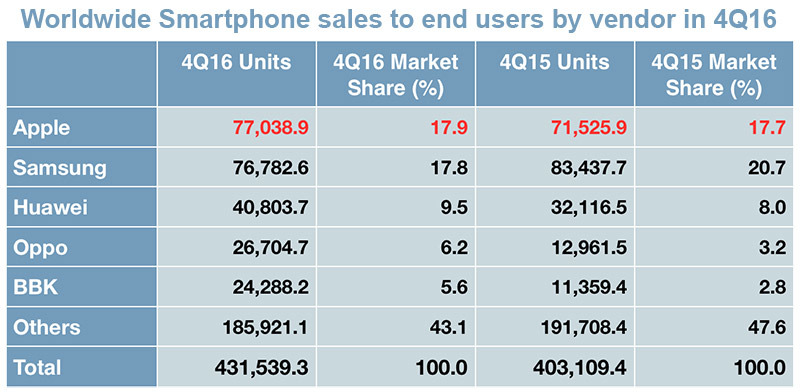







-m.jpg)






 Marko Zivkovic
Marko Zivkovic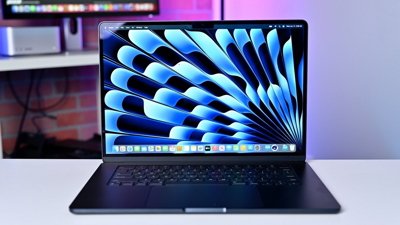
 Wesley Hilliard
Wesley Hilliard
 Christine McKee
Christine McKee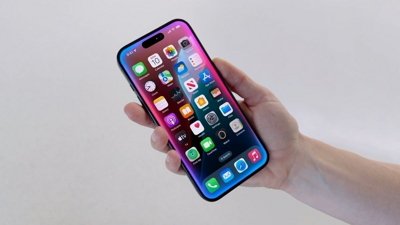
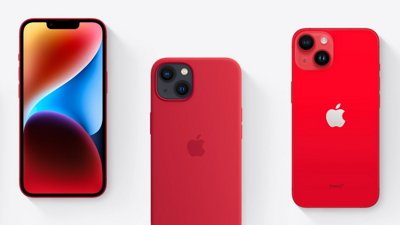
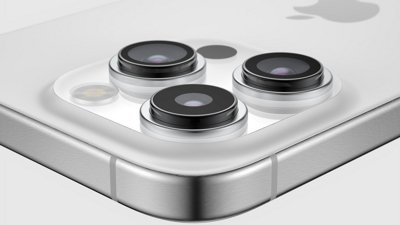
 Malcolm Owen
Malcolm Owen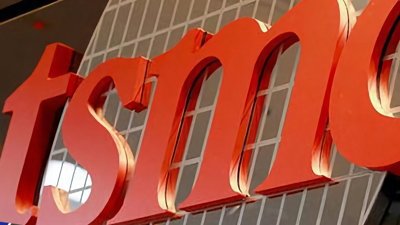
 William Gallagher
William Gallagher
 Andrew O'Hara
Andrew O'Hara

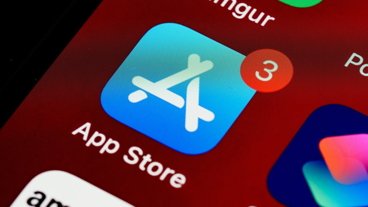





16 Comments
Congrats to go Apple!
Keep the focus on making great products and the rest will take care of itself.
Go Apple.
Gosh I hate talking overall unit market share. It's so meaningless.
Anyone who brings a new Samsung smartphone into a house with a newborn considering all the news lately needs to give themselves a serious look in the mirror. There's Apple and any other number of makers to choose from over a company who refused to recall phones that were continually going up in flames. They cannot be trusted. I wouldn't mind but I can still recall my friend had his one-day-old Galaxy smartphone (I think 5) where the cover on the button port fell off, which I believe was one of the things that helped it be water resistant—one of the reasons he bought the phone; other reason is he saved €99 over an iPhone (he thinks like that). So it simply fell off by itself after one day of normal use and when he returned to the store was informed Samsung won't cover aesthetic issues (they used a different term). Says all you need to know about Samsung. They don't fix phones that break through no fault of the user after one day of use and they won't recall a phone that doubles as a bomb. In my view you buy a Samsung after this debacle and you get what you deserve. If we don't hold companies to account when they treat us like fools then we are fools.